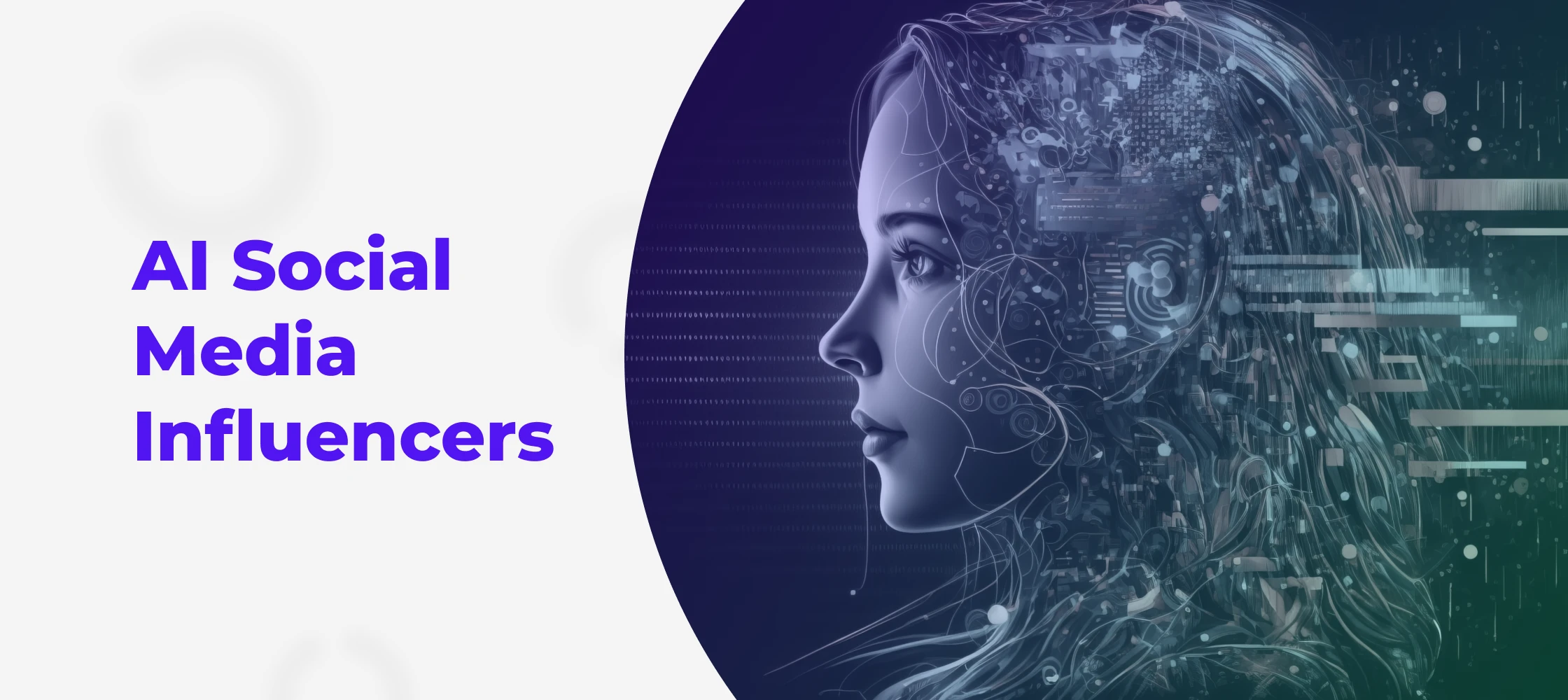AI influencers have been around for more than 15 years, but more recently their popularity has increased significantly due to advancements in Artificial Intelligence technology and the industry at large. AI social media influencers have a strong presence on social media platforms like Instagram, with over 250 virtual personalities on that platform alone, and many businesses are now considering them as an affordable way to promote their products. Read on to learn exactly how these AI influencers operate and how they’re impacting the current social landscape.
What are AI Social Media Influencers?
AI social media influencers are digital personalities created by 3D artists (usually hired by tech firms and startups). While actual humans design these AI influencers and can moderate the process, AI influencers have a social media presence and interact with their followers just like a regular human influencer would. Thanks to AI, they can engage with audiences, generate their own content, and evolve over time based on feedback and user data. They are often used in retail social media campaigns to promote various brands.
Aside from the fact that they are computer-generated, AI influencers have several characteristics that differentiate them from humans and make them an attractive option for marketers.
24/7 Availability
One major difference between human and AI influencers is availability. Unlike human influencers, virtual influencers are available around the clock, since they do not need breaks or downtime.
Virtual Personalities
AI social media influencers are computer-generated personalities developed to replicate the look, behavior, and lifestyle of real humans.
Data-Driven Content Creation
AI influencers consistently create content that is optimized for maximum impact. They do this by analyzing vast amounts of data to identify audience behavior, popular trends, and other useful details, then generate content based on their findings.
Fully Customizable
Since creators have full control over AI influencers’ behavior, image, and lifestyle, brands can fully customize AI personas for each marketing campaign.
How AI Influencers Operate
Virtual influencers are created to closely mimic normal human behavior. The idea behind AI influencers is to develop the “perfect” persona that a specific target audience can easily relate to.
Program and coding
These AI-generated personas are developed using advanced programming algorithms and machine learning models to portray the exact images and personalities the creators are looking for.
Advanced algorithms
Advanced algorithms are used to teach the AI influencer behavioral patterns of users, language nuances, audience preferences, brand guidelines, marketing goals, and more. This enables AI influencers to respond more naturally to real people while sticking to brand strategies.
Persona development
To make AI influencers more relatable to humans, developers take the time to create personas that are customized based on specific target audiences. This includes defining the influencer’s appearance, voice, and style.
Real-time interaction
AI influencers are built to respond to their audiences instantly. They reply to comments, queries, and other interactions in real-time, providing a personalized experience for followers.
Continuing engagement
Because AI influencers are always available, they can respond to their followers’ queries right away. This allows them to capture followers’ attention when they are most engaged, which improves the overall experience for the human being.
Prevent issues
When using AI influencers in marketing, a major consideration is being mindful of breaches. Brands are expected to ensure that they are not using celebrity (or any human) images without permission, for example. Other considerations include ensuring brands are not circulating false information and that they are not using other creators’ content without permission.
Campaign results
AI influencers can positively impact marketing campaigns since they are trained to deliver customized content to their audiences and can boost engagement by responding to followers instantly.
The Impact of AI-Generated Influencers
AI influencers offer many benefits for brands, and more marketers are looking to capitalize on those benefits in their campaigns.
Lower brand risks
One benefit of AI influencer marketing is that it offers lower risks for brands. Controversial or unpredictable behavior by human influencers can negatively affect brand image and reputation. Since AI influencers are under the strict control of their owners, these risks are lower.
Increased exposure
AI influencers have no need for downtime or breaks, which means they can interact with their audience at any time. This vast availability coupled with targeted engagement can lead to greater exposure.
Boost engagement
AI-generated influencers can be programmed to post content at specific times that their target audience is most likely to react to, which can boost engagement. They can also be developed to post highly targeted content for precise demographics, which can increase engagement and reach new audiences.
Market presence
Although AI influencers are by no means a new concept, their popularity greatly increased in recent years as a result of newer AI technology emerging. A large percentage of marketers already plan to use AI influencers and other AI technology in their marketing campaigns.
Increased financial support
More businesses are willing to invest in the development of AI influencers to help in their marketing efforts. According to Fiverr’s Spring 2024 Business Trends Index, businesses are increasingly searching platforms for developers to create AI influencers for their brands. According to the report, the search for AI influencer developers increased by 6,305% in the last six months.
Challenges of AI-Generated Influencers
As with any marketing technology, AI influencers come with their fair share of challenges.
Devaluation of human innovation
Since AI influencers can produce good marketing results at significantly lower costs than human influencers, this can lead to the devaluation of human effort. Brands are now able to negotiate much lower fees for human influencers, using the readily available, more affordable AI influencers as a bargaining tool.
Authenticity and human connection
Human beings connect and form bonds with each other based on their similar interests and experiences. Since AI influencers’ experiences are not real, it can be difficult for humans to genuinely connect with them.
Higher competition
As more businesses start using AI influencers to promote their brands, the market may eventually become saturated. This could make it more difficult for new developers to enter the market and grow an audience.
Transparency and disclosure
Despite the effectiveness of using artificial intelligence in their marketing, brands still need to focus on maintaining trust with their audience. This means they are expected to uphold a level of transparency and make it clear to their audience when they are using AI technology. Depending on the audience, the technology could be readily accepted or rejected.
Case Studies of AI Social Media Influencers
There are several AI social media influencers currently active, from human rights activists to pop stars, tech support agents, fashionistas, and more. Below is a list of some well-known influencers.
Lu do Magalu
With 7 million followers on Instagram, 7.3 million on TikTok, and over 1 million on X, Lu from Magalu is the most popular AI influencer around. Lu first appeared on the social scene in August 2009 to promote programs and products on behalf of the Brazilian mega brand “Magalu” (Magazine Luiza).
She is most known for unboxing videos, software tips, and product reviews. In 2019, Magalu saw a huge profit of $552 million.
Lil Miquela
This 19-year-old Brazilian-American pop star first appeared in 2016 when she mysteriously started posting about her life on Instagram. Her first single, “Not Mine” was released in August 2017, and generated over 15 million net streams.
Aside from pursuing her passion as a pop artist, she’s also an advocate for equality and advertises for forward-thinking brands. She was listed as one of Time Magazine’s ‘25 Most Influential People on the Internet.’
Thalasya Pov
Thalasya is an Instagram “it” girl who funds her lifestyle by advertising for restaurants, hotels, resorts, and other businesses. She spends her time traveling through Indonesia and the US. She also owns a clothing store called Yipiiiii with her good friend Zeline. She currently has an Instagram following of almost 460k.
Embrace AI Influencer Marketing with ICUC Social
AI influencer marketing offers many benefits for brands, and can significantly reduce marketing costs. ICUC’s social listening services use AI to help you identify who is talking about your brand on social media. This data can then be used to create vibrant online communities.
Ready to start incorporating AI influencers in your marketing strategy? Book a meeting with us.

